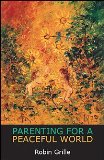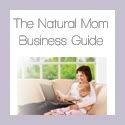The following is a transcript of an interview with Robin Grille, author of Parenting for a Peaceful World.
The interview initially appeared on Natural Moms Talk Radio in July of 2006, before this blog was launched. So I thought I would publish it here for your reading pleasure. ![]()
Natural Moms Talk Radio Show #18
Carrie: Robin is the author of a book entitled Parenting for a Peaceful World. I have to say that when I received your book, I could not put it down for nearly two days and the only reason I could put it down was I misplaced it for a couple of days and then I found it again, so I have not completed reading it, but I am about three-fourths of the way through and it is just phenomenal. It is fascinating.
Robin Grille: Yeah. Look, I am glad you are enjoying the book and the information in it, it was so fascinating to me also, which is what made me really have to get out and write this book, which took me about five years to write and there was years and years of research that went into it.
Carrie Lauth: Yes, I can tell and part of what was so fascinating about it was chronicling child-bearing practices through the centuries and that is a bit depressing to be honest. Was it very upsetting for you to learn some of the things that you did about child-bearing through the years?
Robin Grille: Well, initially it was shocking to me. It was deeply upseting because I had never realized just how brutal a lot of parenting customs have been in just about every civilization around the globe for such a large period of history, but the reason that I put that in the book is that ultimately the news is extremely hopeful because there has been a steady evolution in child-rearing practices over the centuries and psychohistorians have defined that, discovered that very clearly.
Carrie Lauth: Yes.
Robin Grille: Particularly in the last few decades, child-rearing approaches have been evolving so rapidly overall towards much more empathic and much more caring, nurturing, and natural ways to relate to children and already that has begun to make a big difference in the world now. I like looking at that sense of evolution because we continue evolving child-rearing customs in this way. Our prospects for the future are extremely, extremely positive.
Carrie Lauth: Yes, yes. It is a very hopeful book. That is for certain. Now, please share with our listeners a little bit more about your background professionally and so on.
Robin Grille: Yeah. I am a psychologist and I am in private practice. I do a lot of counseling and psychotherapy with families, with couples. I do not work directly with children, but I do like to work with adolescents and when parents come to see me for help with issues to deal with their small children, I prefer to work with the parents than to empower the parents in how to relate in new ways to the children to create just more satisfaction and more pleasure in their relationships.
Carrie Lauth: Okay, so one of the things that we wanted to talk about today was how to set healthy boundaries with our children. Your book talks a lot about the impact that shaming and of course punishment, which is something that we are learning more and more about, but even some of the psychological punishment like shaming a child, some of the impacts that that has on a young person.
Robin Grille: Yes, shaming really needs to be talked a lot because I guess it is clear, it is a lot easier to define what corporal punishment is and the research around the world is just so utterly convincing that corporal punishment will just create a lot of, not just psychological problems, but generally in the community it ends up creating, if not directly more of a tendency towards violence, it certainly desensitizes people.
It makes people a little bit more accepting of violence and I do not need to say much about how bad that is for all of our societies at the moment, whereas with shaming, shaming is a little bit harder for some people to identify, but it gets done a lot in so many families and almost every family there is an element of shaming when parents get really exasperated with their children’s behavior. Very commonly, a way to control children is by causing them to feel ashamed and we call them names, we tell them they are naughty, we tell them they are silly. In more extreme cases, we tell them how stupid they are.
There are other examples of shaming. There are other forms in which it comes like when we compare our children, “Why can’t you be more like your big brother?” “Why can’t you be more like so and so?” “The other children aren’t behaving like you, why can’t you change?” Or even the gender bias expectations like little boys do not cry, boys do not cry, or girls do not behave that way, etc.
So, when we make a child feel ashamed, we might get some kind of, you know, we feel like we have won because we get children to be more compliant potentially, but there is something very scary that is brewing underneath and what researchers have found and psychotherapists I am noticing more and more is how toxic and how corrosive shame is.
It is probably a lot worse than corporal punishment. It makes us all feel very inhibited. It dulls their creativity. It can be quite a major factor in developing depression, anxiety disorders, particularly social phobias. It really, really places the limit on people and it is sad for what that leads to in our relationships with one another.
So much of conflicts in relationships have their origin in trying to stop their partners from saying things that make us feel ashamed that we felt when our parents shamed us when we were children. Also, shaming is a major factor in violence. It makes people very angry and very reactive and a lot of the bullying that we see in schools, very often the bully becomes the bully because they feel so ashamed inside. They compensate for the shame by trying to get on top of the hate as if were trying to get in control and they try to get good feelings about themselves through their violence, they are getting people to obey them.
So, we are really quite collectively needing to learn new ways because boundaries are so important. They are absolutely essential with our children particularly from the toddler years onward. We are all faced with an urgent need to learn how to set boundaries strongly without recourse to punishment and without recourse to shaming.
Carrie Lauth: Well, you know what is so interesting about that is that as adults we have a lot of difficulty setting the healthy boundaries in our adult relationships and that is probably because we did not have many models of that growing up as children. Would you say that is a fair statement?
Robin Grille: That is absolutely the case for I guess most people. Sadly, the way our parents and our teachers in particular set boundaries with us was through corporal punishments and/or shaming, so we do not have very good role model to how to set boundaries in a healthy way, but also we have reactivity, how reactive we are…
Or over reactive we are to our children’s emotionality. That is the result of how we were treated as children and nervous systems are a little bit more wired. We lack the neurological capacities for patience and space, so that we can respond to our children in a creative, in a compassionate and gentle way. We are all in a way surviving our childhoods from the last generation and trying to do better.
Robin Grille: But anyone can learn how to be… Essentially, if we understand that being assertive with our children has nothing to do with being aggressive with our children…
Robin Grille: So, we can be very strong without being punishing. So long as we are expressing our needs and our feelings to our children with honesty and with emotional transparency, if we let them know look what you just said I feel very hurt by what you have done or I feel angry by what you have done. It is that level of honesty that ultimately has the most, the greatest chance of really making a connection with our child and then they will start behaving in a way that is respectful, not because they are afraid of us and they want to get our approval, but because they genuinely feel empathy and respect for who we are at first.
Carrie Lauth: Well, back to that point which is profound about how we over react to our children’s conduct because we are basically reacting to the way we were treated as children, those feelings coming up in us, what hope do we have to overcome that tendency? Is it education and realizing that that is what it is truly about?
Robin Grille: Yeah. I think there is quite a bit of hope and that hope is really proportional to how committed we are to our own healing process. There are all kinds of ways that we can learn and not just learn what to do, but learn how to feel more tolerant and more patient of our children. Any loving relationships that we have in adulthood have the potential to be very healing. Counseling, therapy, personal growth groups, even sometimes things that we read, that can be deeply inspiring. All of those things can combine.
If we are open to learning and growing, all of those things can combine very strongly. Also, what is coming to light is that our children, our loving contact with our children particularly from the earliest moments through holding, cuddling our children, through sharing loving moments, breastfeeding, even for dads as well when we play with our children, all those experiences are actually not only nurturing to our children, they are very healing for us as parents and they amplify our capacity to be loving and emphatic. It is quite incredible. We always think of as parents how we raise our children as if that is something that we as adults do to them. It is very mutual.
Carrie Lauth: Yes.
Robin Grille: At the same time as we are raising our children, our children are actually showing us and teaching us how to be better people.
Carrie Lauth: Yeah. Yeah, that is true. I saw a quote the other day, it said parenting is not about the child, it is about the parent. Very true.
Robin Grille: Yeah, that makes a lot of sense.
Carrie Lauth: Yeah. Well, in your book, you talked a lot about the research that has been done about the developing brain and what does that imply for the parenting behaviors?
Robin Grille: Oh, the new brain research I have to tell you is the most exciting branch of new discoveries that I have ever come across and it really… Look out for this because it will change the world, the things that we are learning about how the brain develops. There are all kinds of implications.
For instance, we are learning that any act of tenderness and affection towards a small child, even an older child, literally causes a cascade of the well-being hormones in the child’s body and around the child’s brain such as oxytocin. That is a hormone. It is a brain chemical that brings about deep feelings of love and empathy. Enough of it even leads to states of bliss.
Carrie Lauth: Yeah.
Robin Grille: Ecstatic states that if you are a breastfeeding mother, you will probably observe that in your baby.
Carrie Lauth: And in yourself.
Robin Grille: Because breastfeeding in particular…
Carrie Lauth: And in the mother.
Robin Grille: And in the mother.
Carrie Lauth: Yes.
Robin Grille: In both. The action, the sucking action from the baby and the physical contact causes a lot of oxytocin to be produced in the mother’s body, also in the baby’s body, as well as in the breast milk, if the breast milk gets charged with oxytocin. Now, there are two good things about this.
One, that of course the more oxytocin the better because it goes from well-being to happiness to joy to bliss, but also oxytocin is literally it is like a fertilizer for the brain. It nourishes the brain and causes the brain to grow, the brain of the child.
Quite specifically in the areas of the brain that regulate emotion, so that the more oxytocin a child gets and the baby gets it is like the healthier their brain is going to be and the areas of the brain the enable a human being to be loving and full of empathy for other humans, for other people, for empathy for our life, those are the areas of the brain that are being nourished by oxytocin. Now, to me I think that is probably the single most exciting discovery in the history of science and the most important discovery.
Carrie Lauth: Yeah. Well, one of the things that I loved about your book was that I have noticed a trend in parenting books over the last several years that kind of leaned towards the nature assumption, in other words that it really does not matter how we parent our children, they are going to basically turn out the same and your book really slides in the face of that.
Your messages that parents matter not only for our own children and what kind of adults they turn out to be, but what kind of parents they turn out to be and what kind of citizens they become and what kind of society we build as a result of that. Do you want to comment more about that, about supporting parents and protecting children is really what is going to create change in our world?
Robin Grille: Sure. Look, I have read some of the books that try to tell us that parents do not matter all that much and children are born as they are going to be as people for the rest of their lives and I found such gaping holes in their reasoning. I found them to be quite disappointing. The only value in those books that I saw is that they really demonstrate that parents are not the only…
Parents are so important and because we are closest to our children particularly when they are babies, we are their universe; however, parents are only one piece of the puzzle. Yes, children will be very strongly influenced by peer groups as well one of the reasons being is that… But most of that brain growth and development happens in the first three years of life up to seven years.
However, there is a new surge of brain growth that happens again during adolescence, which makes us more open and vulnerable again and that a lot of that personality does get, on a more superficial level, it does get shaped again by interaction with their peers as adolescents.
So, it is true that parents are not the only factor. However, I can tell you that by far, by very, very far the bulk of science has now made it very clear that although genes do influence our temperament, they are neutral insofar as our emotional intelligence.
When there are problems such as dysfunctions, painful problems like depression, anxiety, you cannot just bring that down to the gene. That is very strongly influenced by our environment. A lot of social problems are very strongly influenced by our environment. In fact, there is no gene at all for violence. People that have a hyperdensity for violence have been found to have very different brains to other people, the part of the brain that regulates emotion has been damaged, has been corroded by high levels of emotional trauma in early childhood because…
Carrie Lauth: Yeah, it is like which came first, the chicken or the egg. Did the brain changes come before the violence or was it the opposite?
Robin Grille: No, it is quite clear now that the suffering of the child comes first. What happens when the child experiences a lot of emotional stress, for a baby and a small child, the greatest bristle by far is separation.
Carrie Lauth: Yes.
Robin Grille: If they are separated from people they are attached to like their parents or caregivers. That is what long hours in daycare facilities are quite damaging.
Carrie Lauth: Yeah.
Robin Grille: But when they experience violence in the family or if they are hit a lot, later on this produces a stress hormone, well a number of stress hormones, the main one is cortisol. The human body is built to be able to tolerate cortisol as long as the stress will go down soon and there is someone comforting and soothing.
When children are exposed to stress that does not get easier for hours, cortisol levels get very, very high and they remain high in the body. That is when you got to really worry because high cortisol levels are for a period of time they are neurotoxic, which means they start to literally kill brain cells.
They kill brain cells in the part of the brain that regulates emotions and helps us to be empathic, caring individuals. That is how the brain gets reshaped towards the brain that will be more anxious or a brain that will be more depressed or a brain that will be more violent.
Suddenly, we are starting to realize that the parenting environment and the social environment that a child has is the all important thing and the implications are very, very powerful that if we want it more peaceful, if we want a society that is more caring of their natural environment, more sustainable in its development, if we want a society that is more observant of human rights and more just and egalitarian, we are not going to get that unless we reform childhood and unless we give mothers and fathers far more support than what we can give them today.
Carrie Lauth: Yes. I believe that. Well, please let our listeners know where they can get your book.
Robin Grille: Yes, for American readers and Canadian readers, my book is available from a website called The Natural Child Project. You can order it online. It is called Parenting for a Peaceful World and the web address is www.naturalchild.org.
Carrie Lauth: Well, I just thought that your book was fantastic and I am looking forward to finishing the last couple of chapters. I have so many pages dog-eared because they are very meaningful to me personally just looking at my own children and people that I know who have had those experiences in childhood and how that has manifested itself into their adult experience. It is just a wonderful book and I thank you so much for taking the time to talk with us.
Robin Grille: It has been a real pleasure talking with you, Carrie, and I really appreciate the opportunity, thank you.










There is an easy way to treat your kids — if they misbehave spank their butts
They will soon get the message
bob miles what a stupid thing to say in response to that wonderful book or even if you just read the artical would you hit your elderly mother if she did someyhing you didn’t like why would tou hit innocent children they’re learning if your boss hit you when you made a mistake whilst learning something new you would probably quit then sue